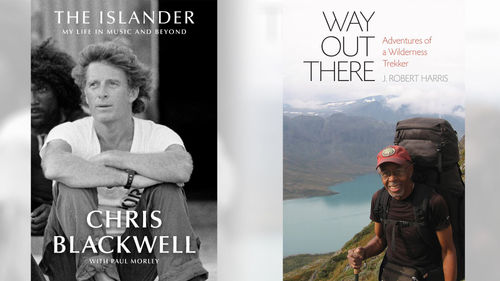
Arnie Weissmann
Autobiographies tend to fall into one of three categories: Fascinating, boring or completely unreadable. Authors are, consciously or not, shaping their legacies, but if that becomes their primary goal it will almost certainly fall into one of the last two categories.
I recently read two travel-related autobiographies that qualify as fascinating: "The Islander, My Life in Music and Beyond," by Chris Blackwell with Paul Morley (Gallery Books, 2022), and "Way Out There, Adventures of a Wilderness Trekker" by J. Robert Harris (Mountaineers Books, 2017). In the spirit of full disclosure, I should acknowledge that I know both men, and I also acknowledge that knowing them brought a level of apprehension to sitting down with the books. I have previously read books written by people I know that were disappointing to such an extent that it changed my overall impressions of them.

"The Islander, My Life in Music and Beyond," by Chris Blackwell with Paul Morley, and "Way Out There, Adventures of a Wilderness Trekker" by J. Robert Harris. Photo Credit: Courtesy of Gallery Books and Mountaineers Books
That wasn't the case with either of these. What makes both so compelling is that each goes far beyond the day-to-day descriptions of their lives and accomplishments and devote as much time to re-creating the outside influences that shaped who they are. Blackwell doesn't use Jamaica merely as a backdrop to his formative years but reveals the 360-degree environment that, in a very real sense, created him. Harris' insights about the places he traverses are deeply connected to the places themselves, which he describes wonderfully.
Providing this context makes these books much more than self-portraits or travelogues. Blackwell takes care not only to reconstruct the Jamaica he grew up in, but also the '60s popular culture scene in London and portrayals of little-known but highly influential people he has met along the way. Harris similarly provides fascinating, and sometimes obscure, historical and geological background about the vistas he treks across, the people he meets and attractions I had no idea existed.
As for "The Islander," I should mention from the outset that, although Blackwell was perhaps more responsible for the revival of Miami's South Beach than any single individual and subsequently built a collection of unique accommodations in Jamaica, the book is 90-plus percent about his music career. He devotes only one chapter to hospitality, lumped in with launching a rum brand and other miscellanea.
But the book will nonetheless engage anyone curious about travel and music. Blackwell's vision for hotels was clearly shaped by his Jamaica upbringing and Island Records experiences, and he reveals himself as an observant world traveler.
As regards his personal life, he's discreet and leaves only a smattering of clues: With the exception of his last wife, Mary Vinson, the reader only knows about his previous marriages with one-off, after-the-fact references to ex-wives. This is not Keith Richards' "Life" (2010, Little, Brown & Co.).
But overall, his written narrative voice accurately reflects his actual storytelling. If my experience reading "The Islander" is typical, one beneficiary of the publication will be Spotify: His musical knowledge is so deep and descriptions of musicians so vivid that I was continually checking out songs and artists he spotlighted.
Harris, who in the mid-1970s started JRH Marketing Services, the oldest African American-owned research and consulting firm, is a solo trekker who travels without a support crew and has made more than 40 two-week treks across remote regions. Though solo, he's never completely alone in nature, and he describes the wildlife he encounters as well as trekkers he's met along the way and is conscious of the pioneers who explored the areas before him. He gives credit where due and devotes one chapter to "the kindness of strangers."
Though typically traveling alone, a neighbor he sometimes hiked with convinced him to consider starting a wilderness guide business. The idea got as far as creating a logo, stationary, business cards and a brochure, and they became licensed guides, but Harris, who was skeptical about the idea, writes, "Thankfully, we never had to take anyone into the backcountry."
And wildlife gets its due, too. One chapter, "Alone and Scared," recounts his trek into polar bear country above the Arctic Circle.
Like Blackwell, Harris also weaves his childhood experiences into the narrative: growing up in public housing and, importantly, being a Boy Scout.
"Way Out There" begs for a sequel -- it covers less than a quarter of his trips, and Harris has told me he has extensive journals chronicling his travels.
It's appropriate, I suppose, for people to wait until they're well into their lives to write their autobiographies, but it's impressive that these are not merely the reflections of men reviewing their accomplishments. Rather, they're a summation of what they've accomplished so far.
Harris is 78 and still planning trips. Blackwell, 84, helped "Get Up Stand Up!," a musical about Bob Marley's life, open in London last year. He writes, "I always said I would live to 94 ... Now that I'm 84, 94 seems to be getting a little close ... I don't want to be greedy, but my mother lived to be 104."